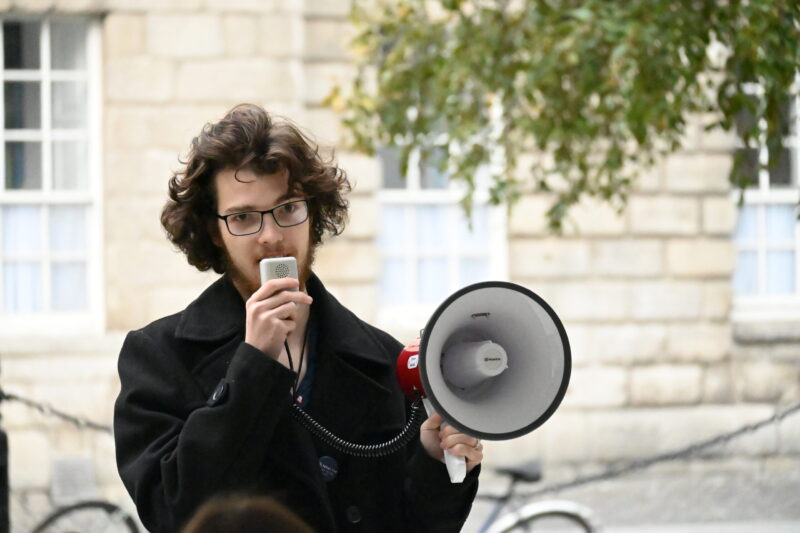As is stated under its duties in the Trinity College Dublin Students’ Union (TCDSU) Constitution, the Electoral Commission (EC) provides interpretations of the TCDSU Constitution itself upon request by any member of the TCDSU.
Two questions have been put to the EC, one requesting elaboration upon the TCDSU President’s role as the “primary representative” of the TCDSU, the other inquiring whether the TCDSU President must automatically second a motion proposed to council if it was voted forward with a supermajority at Union Forum (UF).
Under Chapter 3.4.3(a) of the Constitution, it states the duty of the role of President is “to act as the primary representative for the members of the Union in the furtherance of the aims and principles of this constitution as laid out in Chapter 1”.
Chapter 1 includes the “Character” and “Aims & principles” of the TCDSU which highlight the responsibility of elected officers to follow policies and defend the interests of its members, respectively.
Upon requesting and receiving further clarification of the first question due to its perceived “broad” nature and scope, the EC decided to address whether or not the President has a “final say” on publication of press releases, campaigns and decisions and positions within the Sabbatical Officer Board.
Last week, as reported in The University Times, a very heated and public argument ensued between the TCDSU and Postgraduate Workers’ Organisation (PWO) on X, formerly Twitter, and via press statements.
The PWO criticised the TCDSU-run class representative elections as “disenfranchising PhD students en masse”. They also argued the paper-balloting system was flawed due to ballots running out and there being no online alternative.
The TCDSU replied via a public statement saying they pulled ballots due to “election interference”, claiming that members of the PWO were harassing polling clerks.
Molnárfi publicly dissented from the statement, indicating support for the PWO and dissent within the Union.
The EC report reminds the President that, under Chapter 3.4.6(a) of the Constitution, the Communications and Marketing Officer (C&M Officer), whom this year is Aiesha Wong, oversees the Union’s internal and external communications. It adds that the C&M Officer is “authorised to manage press releases” in order to “maintain the integrity of the Union’s identity”, concluding that “the President does not have a final say on the publication of press releases”.
The EC report also reminds the President that although they are responsible for setting strategy in relation to campaigns, they “must” consult with the C&M Officer when publicising Union campaigns and that there is no veto mechanism which the President can use to overturn a decision made by the Sabbatical Officer Board.
As a result of the fallout with the PWO, the Education Officer Catherine Arnold is proposing a motion to Student Council tonight to withdraw TCDSU support from PhD Groups, namely the PWO. It is seconded by all the Sabbatical Officers, except the President, having been voted through and approved by a supermajority of 18:2 at the last UF on 12th October.
As the President did not second the motion, the EC report provides a clarification on Chapter 4.8.1(j) of the Constitution in response to the question concerning the President’s obligations to second a motion when approved at UF with a supermajority.
It states that the President is “constitutionally obligated” to second proposals voted through by a supermajority at UF and reminds Molnárfi that when he does not do so he risks “undermining the authority and credibility” of UF, “stifles the democratic decision making processes” of the TCDSU and “creates an environment where certain voices or perspectives are systematically oppressed”.
The EC also admit that the President is free to choose which motions he seconds as “free will” as established under Irish Law.
Molnárfi shows no signs of softening his stance, releasing a statement on Instagram last night accusing the proposers and seconders of the motion to remove TCDSU support for PhD groups of “union busting”, “attempting to drive a wedge in our unity” and sees it as an “attack on solidarity between undergraduates and postgraduates”. He also argued that the PWO are the only organisation that represents postgraduate researchers.
In response to Molnárfi’s statement and in a statement to The University Times, the TCDSU have sought to clarify the motion to remove support for PhD groups. They say that they are only seeking to withdraw support for the PWO and not for postgraduate students, whom they are constitutionally mandated to represent.
They also want to make clear that “the motion is motivated by allegations of harassment towards TCDSU volunteers” and that the allegations are currently being brought to the Junior Dean. The TCDSU claim that the motion passing would not mean “cutting all ties” with the PWO, and say that they have met with the PWO to affirm their “willingness” to work with them.
In a statement to The University Times, Trinity PWO said: “It is incredibly disappointing to see this motion tabled to remove the mandate of support that the TCDSU passed for the PWO.” The PWO called the actions of the EC amidst the elections “confusing and alarming”, adding: “This level of obfuscation has not been seen since the late days of the GSU which ultimately led to its dissolution by the Capitation Committee.”
The statement concluded: “We wish to see the TCDSU, PWO and future postgraduate body within the university working together to improve the quality and conditions of education in Trinity. Regardless of the outcome of tonight’s vote, we will continue to fight for these improvements — but we would rather do it standing in solidarity with the undergraduate body.”








